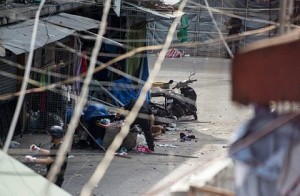
Police officers investigate the blast site where a body of one of the two victims lies on the ground at Quiapo, Manila on May 7, 2017.
AFP PHOTO
Philippine police believe a Shiite Muslim cleric was the likely target of explosions that killed two people in Manila, an official said Sunday, rejecting Islamic State claims of involvement.
Six others were injured when two explosions rocked the office of the imam, Nasser Abinal, in the capital’s busy Quiapo district on Saturday.
Oscar Albayalde, head of police forces in the capital, said the bomb was apparently intended for Abinal who is also government tax officer for the Manila region.
He was not at the office at the time.
“He admitted there were threats to his life in the past” while being questioned by police, Albayalde told AFP.
The bomb was carried in a package by a hired delivery man who handed it over to an aide of Abinal just before it went off, killing them both.
As police were searching the blast site late Saturday, another explosion rocked the area, possibly from a second bomb planted earlier, said Albayalde.
“This has nothing to do with terrorism. There is no indication that this was done by a terror group, local or foreign,” he said.
The Islamic State group has claimed it staged the explosion.
“Five Shiites were killed and six others wounded in a bomb blast by Islamic State fighters in the center of Manila,” said a statement from Amaq, IS’s propaganda arm.
Albayalde said this was just the IS custom of taking credit for any such incidents.
The Islamic State has carried out attacks in other countries on Shiite sites and events.
But Albayalde said the attack seemed to be targeting Abinal, adding that it may be for personal reasons, his work or his religion.
Tension remained high after the blasts, with police cordoning off the area again on Sunday after a suspicious bag was spotted.
A bomb disposal robot later established it was a false alarm.
Philippine President Rodrigo Duterte’s spokesman Ernesto Abella urged the public to stay alert but avoid spreading “unverified” news that may cause panic.
The Philippines is a mainly Catholic country but has a significant Muslim minority, some of whom live in the Quiapo district.
Just over a week ago another explosion injured 14 people in Quiapo as Southeast Asian leaders were meeting for a summit a few kilometers away.
IS claimed responsibility for the April 28 explosion, but police insisted it was not a terrorist attack and not related to the gathering of political leaders.
Local Muslim militants who have pledged allegiance to IS are based in the southern Philippines, hundreds of kilometers from Manila.